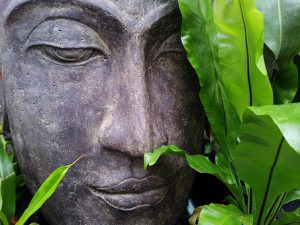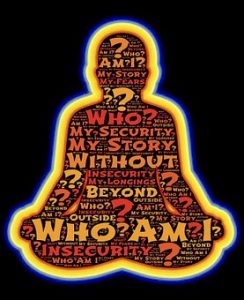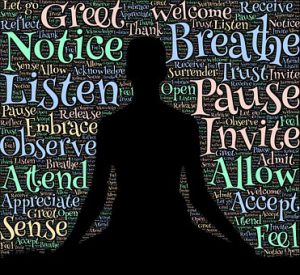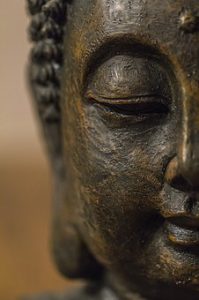Wednesday
Featured StoriesGiving the Ghost a Voice, Part I
Contradictory feelings about race can be honored in Buddhism.
by Bryan Mendiola
 I didn’t realize how much I had been skirting issues of race in my life until my Buddhist path, quite unexpectedly, led me right back to them. When I completed my graduate training as a psychologist about eight years ago, I was convinced that I would not embrace the work of multiculturalism and diversity again (at least outside my professional life)—unless it was in a space of both understanding difference and skillfully working with the powerful emotions that arise in that understanding. For as powerful and awakening as my early multicultural training had been, I was often left in more confusion, anger, and resentment, not knowing how to actually work with personal issues of race in my everyday life.
I didn’t realize how much I had been skirting issues of race in my life until my Buddhist path, quite unexpectedly, led me right back to them. When I completed my graduate training as a psychologist about eight years ago, I was convinced that I would not embrace the work of multiculturalism and diversity again (at least outside my professional life)—unless it was in a space of both understanding difference and skillfully working with the powerful emotions that arise in that understanding. For as powerful and awakening as my early multicultural training had been, I was often left in more confusion, anger, and resentment, not knowing how to actually work with personal issues of race in my everyday life.
But in my Buddhist study and practice in subsequent years, I found the understanding and the skillful means I was seeking, and my relationship with race has been evolving ever since. For the last several years, I have been involved in the diversity and inclusion work of my sangha, first as the chair of the Diversity Committee at Shambhala Boston, developing and facilitating a regularly meeting meditation group to explore issues of identity and culture, called “Who Are We?”. More recently, I began working with the Diversity Working Group of Shambhala International to address multicultural competence training as well as curriculum and program development.
 In essence, the diversity work I’ve done the last few years has been a combination of 1) the spiritual practice of investigating the mind and heart, and 2) a continual and mutual sharing of stories of personal, cultural identity—stories that make the invisible visible, give voice to that which feels silenced in us, and allow space for others to explore and express who they are, however vulnerable or insecure that may feel. In the “Who Are We?” meditation group that I facilitated, participants would meet twice a month to practice meditation and engage in dialogue about personal experiences of culture and identity, and how the Dharma impacts those experiences.
In essence, the diversity work I’ve done the last few years has been a combination of 1) the spiritual practice of investigating the mind and heart, and 2) a continual and mutual sharing of stories of personal, cultural identity—stories that make the invisible visible, give voice to that which feels silenced in us, and allow space for others to explore and express who they are, however vulnerable or insecure that may feel. In the “Who Are We?” meditation group that I facilitated, participants would meet twice a month to practice meditation and engage in dialogue about personal experiences of culture and identity, and how the Dharma impacts those experiences.
 As a foundation for our group discussions, we provided the following guidelines: sharing more from personal experience than conceptual mind; listening from a place of openness and curiosity; being engaged and present at a physical and psychological level; respecting other people’s identities and perspectives; and sharing responsibility for safety and nonjudgment in the group. In the Shambhala community, this is what is known as “social meditation.” Meetings have focused on topics of racism, gender identity, sexuality, dating and relationships, age and aging, mental health, and class and money. Discussion questions have included the following: What is your relationship to whiteness? How did your family of origin discuss mental health issues? Where do you meet your comfort edge when it comes to gender expression? What is an experience you’ve had of feeling excluded because of your identity/culture? What are your views on growing older? How does class and work reflect your values, expectations, and aspirations?
As a foundation for our group discussions, we provided the following guidelines: sharing more from personal experience than conceptual mind; listening from a place of openness and curiosity; being engaged and present at a physical and psychological level; respecting other people’s identities and perspectives; and sharing responsibility for safety and nonjudgment in the group. In the Shambhala community, this is what is known as “social meditation.” Meetings have focused on topics of racism, gender identity, sexuality, dating and relationships, age and aging, mental health, and class and money. Discussion questions have included the following: What is your relationship to whiteness? How did your family of origin discuss mental health issues? Where do you meet your comfort edge when it comes to gender expression? What is an experience you’ve had of feeling excluded because of your identity/culture? What are your views on growing older? How does class and work reflect your values, expectations, and aspirations?
One experience that stands out for me came while leading a group experience during a leadership retreat for a culturally diverse group of young adults in their twenties and thirties. After a period of sitting practice and establishing the group guidelines, I initiated the discussion with the following: “What are the first three words that come to mind when you hear the word ‘women’? What meaning do you make of these three words specifically?” After several participants shared their stories, one young woman opened up about how the words she thought of reflected positive qualities of womanhood, denoting strength, intelligence, and beauty. But then she expressed, with great vulnerability, how in all areas of her life she secretly denies that she herself has any of these qualities. No one in her life was fully aware of how she belittled herself, and she was clearly pained by this lack of awareness. This was something she had not thought about in this way or shared publicly in this manner. Her story seemed to stop the room cold, leaving many people at a loss for words.
 This left me with an increased understanding that we all suffer around our identities. As much as we may seek to know the painful experiences that others may have, hoping for intimacy and connection, there is a part of us that also doesn’t want to see or acknowledge this suffering—even with those we care about most. Perhaps really seeing the truth of people’s experiences means that we have to face the passion, the aggression, the ignorance that exists, not only in the world, but also within ourselves. My commitment as a Buddhist practitioner is to the awakening to truth, the truth of reality, the truth of suffering. We share our stories to share our truth, to share our pain and vulnerabilities, to share our healing and growth—so that we can see more clearly the greater, collective truth of reality.
This left me with an increased understanding that we all suffer around our identities. As much as we may seek to know the painful experiences that others may have, hoping for intimacy and connection, there is a part of us that also doesn’t want to see or acknowledge this suffering—even with those we care about most. Perhaps really seeing the truth of people’s experiences means that we have to face the passion, the aggression, the ignorance that exists, not only in the world, but also within ourselves. My commitment as a Buddhist practitioner is to the awakening to truth, the truth of reality, the truth of suffering. We share our stories to share our truth, to share our pain and vulnerabilities, to share our healing and growth—so that we can see more clearly the greater, collective truth of reality.
 Bryan Mendiola is a Filipino/Asian American psychologist and a student of Shambhala Buddhism. He lives with his wife and son in Western Massachusetts.
Bryan Mendiola is a Filipino/Asian American psychologist and a student of Shambhala Buddhism. He lives with his wife and son in Western Massachusetts.
Editor’s note: this story was previously published in the Harvard Divinity Bulletin, and is reprinted here by permission of the author.





May 20, 2016
Reply
Dear Bryan,
Thank you for your on-going, heartfelt willingness to hold raw, inherently difficult spaces. What necessary work you are doing. Your life contemplations, and obvious insight and tenderness in those contemplations, allows others to discover their own honesty, edges, and vulnerabilities. Powerfully, these reveal themselves as our strengths. We, as your community in Shambhala and beyond, are listening.
With thanks, Rheanna
May 20, 2016
Reply
Thank you, Bryan, for this article. My own experience of various identities, including that of Buddhist and Shambhalian, have caused me much self-reflection on suffering and impermanence and are a huge part of my path in this lifetime. Some identities have been more troubling than others for me, some have been more troubling for others, and mostly I am grateful for the luxury of time to reflect on these aspects of humanity as opportunities to develop more compassion.
May 18, 2016
Reply
Dear Bryan,
As you step forward on your personal path, we as a community benefit. When we listen deeply, something changes within and we, too are inspired to step forward. Thank you for all your work and your contributions to the Diversity Working Group.
May 18, 2016
Reply
Hi Bryan,
Your article is very much from the heart and to the point as we do the inner and outer work of waking up and connecting. The possibilities for contagiousness – your ideas, questions, and discussions rubbing off on other individuals and groups – is what we need at this time.
Thank you, Robert